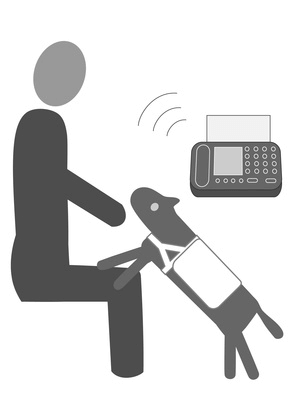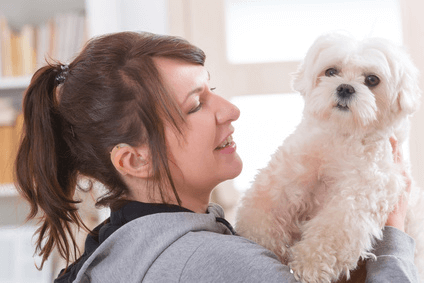I read an interesting article online the other day about what a non-profit organization in Japan is doing about the problem of abandoned dogs. This organization, although they cannot rescue all the dogs, have opened a facility in Yokohama, Japan that will implement a training program for these abandoned dogs to be trained as service dogs for the deaf.
Hearing dogs for deaf people are trained to alert deaf people to sounds, both inside and outside of the home. Sounds such as fire/smoke alarms, telephones, door knocks, doorbells, oven timers, alarm clocks, etc. that we on a daily basis take for granted. Without the dog a person is dependent on someone else for this.

It has been shown that hearing dogs for deaf people will increase a deaf persons’ feelings of security and confidence.
Organizations involved in dog training programs for hearing dogs, look for these dogs in rescue centers, private homes, breeders and pounds. They are always looking for new sources especially with rescue groups.
They look for dogs that have a friendly disposition, alertness, intelligence good temperament and confidence. Eventually these dogs will have to be reliable in all types of situations. They also look for people that can foster these potential hearing dogs. Like the seeing eye dog these dogs first need to be socialized and obedience trained.
Although these dogs can be trained in as little as three months, most dog training programs for this type of trained dog takes closer to a year.
Obedience training and socialization is quite extensive. The dogs are then normally trained in a home-like environment to recognize and react to sounds that will be found in the new owners home.(Telephones and doorbells are different in every persons home). Part of the training will take place in the new owners home with the dog and the trainer. When training is completed the new owner and dog do have follow-up with the trainer to make sure everything is going ok.
The new facility in Japan will also be training young people on how to train these dogs as hearing service dogs.
It is believed that approximately 10,000 people with hearing disabilities are waiting for a service dog, so not only are dogs are needed but trainers as well. The students will undergo a six month training course, part of which requires them to work with a potential hearing dog for three hours a day.
Once a student completes the course they can obtain support to further their education and hopefully find a job in their related field.
Again not all abandoned dogs are rescued since this organization looks for the above mentioned characteristics in potential dogs to be trained for the hearing impaired.
The agency is hoping that this new facility will raise the public’s awareness of the plight of the abandoned dogs and the use of hearing dogs.

When accompanied by their masters these dogs have legal access to all public places. They often wear a bright orange leash and collar to identify them. Hearing Dogs may accompany their owner into public places, such as grocery stores and restaurants since they have the same legal access rights as a Guide Dog for the blind.
So who is eligible for one of these well trained dogs? Priority is given to candidates over 18 years of age who have at least a 65 decibel hearing loss(unaided). Also priority is given to a person living alone or with another deaf or hard of hearing person but a deaf person living with a hearing person will also be considered. The candidate must also be physically able and willing to care for and continue the training of the dog.
Yes once again we see that dogs are truly amazing creatures.
Share This: